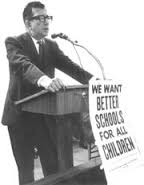 Again on Sunday, the pages of the New York Times managed to confuse the nature and history of school reform. The op-ed by Richard Kahlenberg and Halley Potter credits the late Albert Shanker with “The Original Charter School Vision.” Now, however one judges the weight of Shanker’s nimble ideology, charters were not his baby until late in the game. Nor do the authors appear to grasp even what the idea of charters was – and is. They see this “vision” as “freeing up teachers and integrating students”; an apparition said to have been delivered to Shanker during a 1987 visit to Germany.
Again on Sunday, the pages of the New York Times managed to confuse the nature and history of school reform. The op-ed by Richard Kahlenberg and Halley Potter credits the late Albert Shanker with “The Original Charter School Vision.” Now, however one judges the weight of Shanker’s nimble ideology, charters were not his baby until late in the game. Nor do the authors appear to grasp even what the idea of charters was – and is. They see this “vision” as “freeing up teachers and integrating students”; an apparition said to have been delivered to Shanker during a 1987 visit to Germany.
Charters, of course, do “free up” teachers, but only insofar as they free up parents to choose them. They are merely an obvious (and much older) suggestion of one legal form that “voucher” schools may take. They are, first and foremost, about lower-income families and the crying need to give back to them the authority and liberty enjoyed by the best of us. Charters are a way to privatize schools that nominally remain in the public sector and – so far – are forbidden to teach religion.
Schools that are privately owned and operated in the “public” sector were part of the discourse of the 1960s. Their specific terms and structure were exemplified in a 1971 volume by Stephen Sugarman and myself, published by the Institute of Government Studies. There ensued a sad story that is worth a brief telling.
Following the passage of California’s Proposition 13, in the early summer of 1978, a Democratic congressman who had read our new volume, “Education by Choice,” invited Steve and myself to dinner to discuss the political possibilities for school vouchers. That evening we agreed to draft a family choice initiative for the 1978 California ballot; he would do the necessary political stuff and raise the money after the campaign for the November elections. We completed the drafting. Leo Ryan did get re-elected. But then he was murdered in Jonestown.
Already deeply committed, we proceeded on our own, imagining that the libertarians at least would finance the effort. To our dismay, Milton Friedman effectively opposed our effort as being overregulated and our own initiative evaporated as a political possibility.
Who should care about such a scrap of history?
It still moves me when I read misunderstandings of the sort in the Sunday Times. The 1978 initiative called these institutions “Independent Public Schools”; they were to live or die according to the free private decisions of parents. Their justification lay in the crying imperative to empower fathers and mothers who can’t afford to live in Beverley Hills or to pay private tuition. If the device would also have “liberated” teachers – as it would – that freedom was to carry all the accompanying threats that parents would not choose them. “Charter” schools – independent public schools – or whatever we call them, survive at the will of the family.
There is a real hero of charter schools, and it is Ted Kolderie, the untiring Minnesota thinker and activist who has been promoting the idea since the 1970s. His beautiful state still has more lakes than charter schools – but the gap is closing.



Shanker proposed what already was happening in NYC and other places – giving teachers a chance to create new schools within the system. There was nothing new about his proposal.
The innovation was when Minnesotans took the idea of creating new schools and combined it with the ideas of
1. having at least one other group besides local districts allowed to authorize a new public school.
2. Giving the new schools greater autonomy in exchange for greater authority over things like budget, personnel and curriculum
3. Requiring that the schools be non-sectarian and open to all (Minnesotans involved in this including yours truly did not agree with the idea of allowing public k-12 schools to use admissions tests for students). That was ok with Shanker (a number of NYC magnets and other magnets around the country were doing it. This was not ok with us.